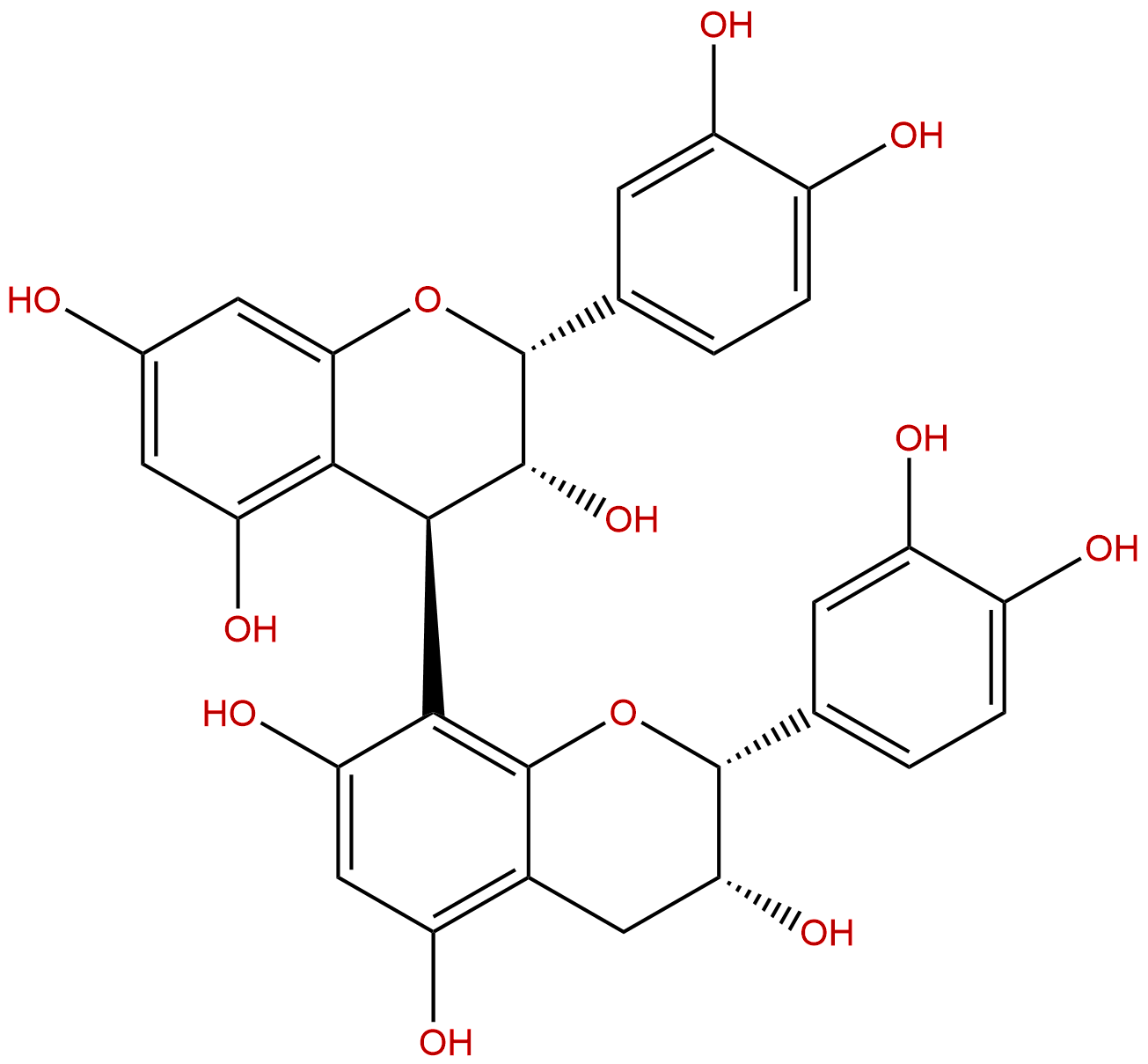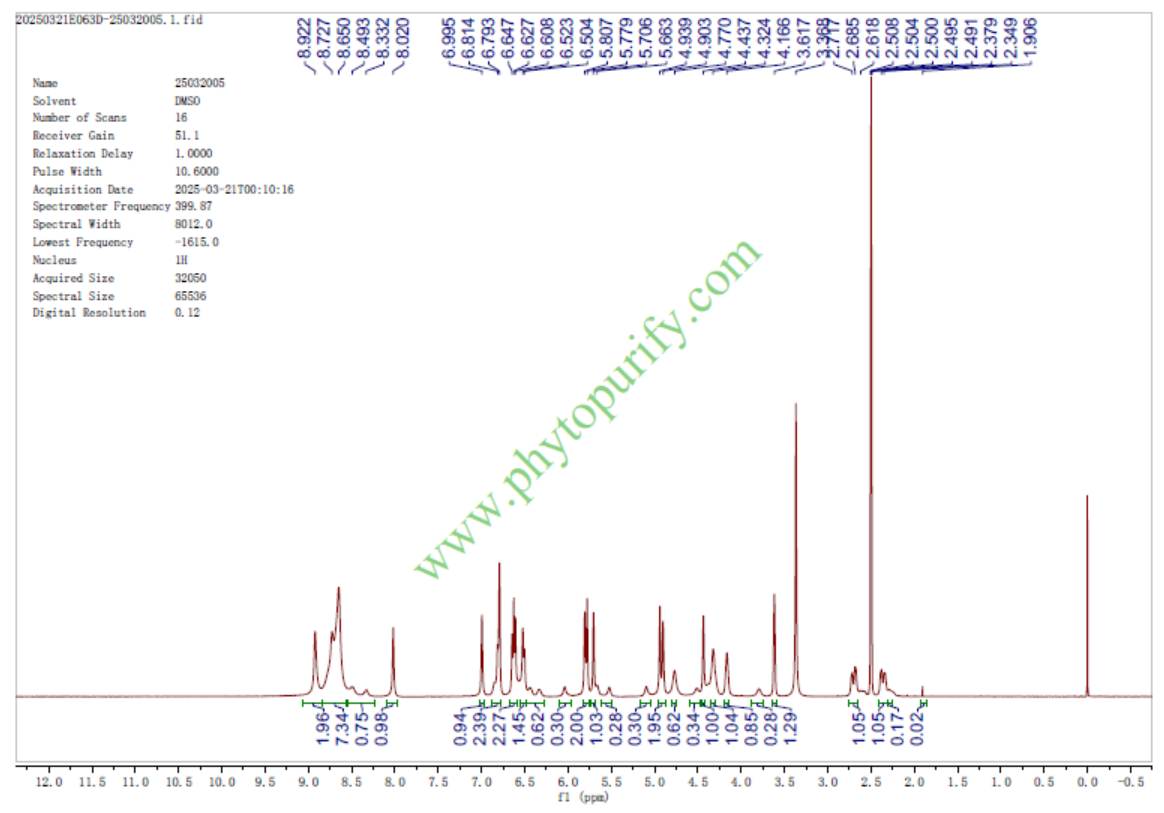
Procyanidin B2CAS No.:29106-49-8
|
||||||||||
 |
|
|
||||||||

| Catalogue No.: | BP1147 |
| Formula: | C30H26O12 |
| Mol Weight: | 578.526 |
Product name: Procyanidin B2
Synonym name: Proanthocyanidin B2
Catalogue No.: BP1147
Cas No.: 29106-49-8
Formula: C30H26O12
Mol Weight: 578.526
Botanical Source: Occurs in Crataegus, Cotoneaster, Nelia meyeri, Malus and Aesculus spp. peanut skins and buckwheat grain
Physical Description: Powder
Type of Compound: Procyanidins
Purity: 95%~99%
Analysis Method: HPLC-DAD or/and HPLC-ELSD
Identification Method: Mass, NMR
Packing: Brown vial or HDPE plastic bottle
Storage: Store in a well closed container, protected from air and light. Put into refrigerate or freeze for long term storage.
Whenever possible, you should prepare and use solutions on the same day. However, if you need to make up stock solutions in advance, we recommend that you store the solution as aliquots in tightly sealed vials at -20℃. Generally, these will be useable for up to two weeks.
The product could be supplied from milligrams to grams, up to kilograms
Inquire for bulk scale.
Descriptions:
Procyanidin B2 (PB2) is a naturally occurring flavonoid widely found in cocoa, red wine and grape juice, PB2 could protect against oxidative stress- and chemical-induced injury in colonic cells by modulating the endogenous cellular defence, PB2 protects against oxidative injury in colonic cells and up-regulate the expression of GSTP1 via a mechanism that involves ERK and p38 MAPK activation and Nrf2 translocation.[1]
Procyanidin B2 (PB2) is one of phenolic compounds in apple pomace, an agro-industrial byproduct in apple juice processing, PB2 at no less than 50 mu g.mL(-1) could significantly suppress inflammation in the LPS-induced cells, shows that high pure PB2 prepared from apple pomace has a remarkable anti-inflammatory property.[2]
Procyanidin B2 exhibits cytotoxic activity to MCF-7 cells and it could be a potential antineoplastic agent. [3]
Procyanidin B2 has toxic property towards triple negative breast cancer cells, it may shows new promise for therapeutic intervention of cancer.[4]
Procyanidin B2( PB2) is absorbed and excreted in urine, and a portion of the PB2 is degraded to (?)-epicatechin and to the metabolized conjugated and/or methylated (?)-epicatechin internally in the rat, PB2 also can reduces the accumulation of lipid peroxide in plasma oxidized by copper ions.[5]
Procyanidin B2 and a cocoa polyphenolic extract inhibit acrylamide-induced apoptosis in human Caco-2 cells by preventing oxidative stress and activation of JNK pathway.[6]
Procyanidin B2 has anti- and pro-oxidant effects on metal-mediated DNA damage by interacting with H2O2 and metal ions.[7]
References:
[1] Rodríguez-Ramiro I, Ramos S, Bravo L, et al.Eur J Nutr, 2012, 51(7):881-92.
[2] Zhang H, Ying C. Bangl J Pharmacol, 2011, 6(2):106-10.
[3] Avelar M M, Gouvêa C M. Indian J Pharml Sci, 2012, 74(4):351-5.
[4]Shilpi A, Parbin S, Sengupta D, et al. Chem-biol Intact, 2015, 233:122-38.
[5] Seigo Baba, Naomi Osakabe, Midori Natsume, et al. Free Radical Bio Med, 2002, 33(1):142-8.
[6] Ramos S, Bravo L, Goya L, et al. J Nutr Biochem, 2011, 22(12):1186-94.
[7] Sakano K, Mizutani M, Murata M, et al. Free Radical Biol Med, 2005, 39(8):1041-9.
[8] Cheng X G, Wen-Zheng J U, Dai G L, et al. Pharm Clin Res, 2013, 21(01):39-41.
HPLC of Procyanidin B2

HNMR of Procyanidin B2
